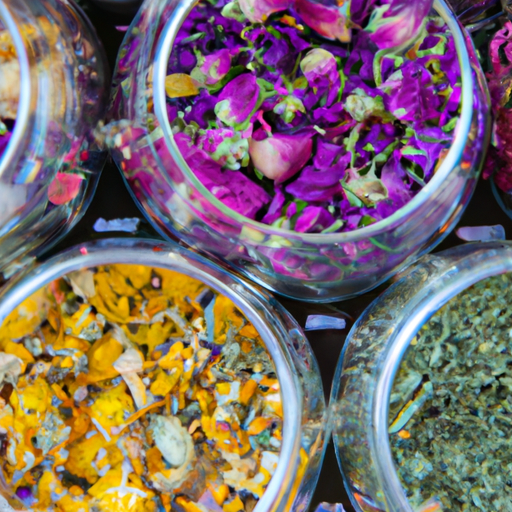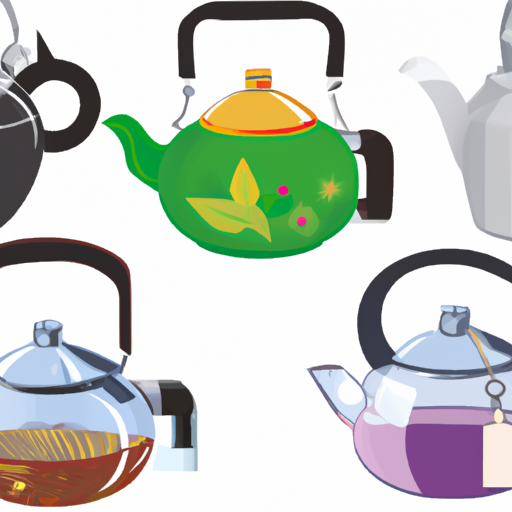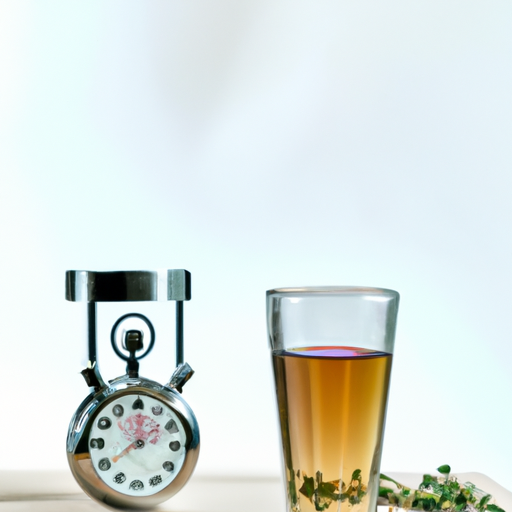Interestingly, in a society that is consumed by coffee culture, tea still holds a special place for numerous individuals. A soothing cup of tea has always been linked to peace, solace, and a brief escape from the hectic pace of everyday life. However, when it comes to selecting the most beneficial choice, the competition between black tea and herbal tea is intense.
As an avid tea drinker myself, I couldn’t help but delve into the age-old debate: which is healthier, black tea or herbal tea? In this article, we will explore the composition, health benefits, caffeine content, antioxidant levels, and potential side effects of both types of tea. By examining the evidence and considering the pros and cons, we can ultimately make an informed choice that aligns with our individual health goals.
So, grab your favorite tea cup and join me on this journey to discover the truth behind the healthiness of black tea versus herbal tea.
Key Takeaways
- Black tea and herbal tea both have their own health benefits and it ultimately depends on individual health goals and taste preferences.
- Black tea is high in antioxidants and can help reduce the risk of heart disease.
- Herbal teas have various health benefits such as boosting the immune system, promoting relaxation, aiding digestion, and enhancing sleep quality.
- Black tea contains more caffeine than herbal tea, so it is important to consider caffeine tolerance when choosing between the two.
Understanding the Composition of Black Tea and Herbal Tea
Let’s dive into the delightful world of tea and explore the unique composition of both black tea and herbal tea! When it comes to flavors, black tea offers a rich, robust taste with a hint of bitterness, while herbal tea comes in a variety of flavors such as chamomile, peppermint, and hibiscus.
Understanding the brewing process is key to appreciating these teas. Black tea is made from the leaves of the Camellia sinensis plant, which are withered, rolled, fermented, and then dried. Herbal tea, on the other hand, is made from a blend of various herbs, flowers, and fruits, which are steeped in hot water.
Both teas offer distinct flavors and brewing methods, so it ultimately comes down to personal preference when deciding which is healthier.
Exploring the Health Benefits of Black Tea
Imagine discovering a tea that not only invigorates you with its rich flavor but also offers a surprising array of health benefits. Black tea, with its long and fascinating history, is a perfect example of such a tea.
Originating in China thousands of years ago, black tea has been enjoyed for its taste and medicinal properties. When it comes to heart health, black tea has shown promising effects. Studies have indicated that regular consumption of black tea may help reduce the risk of heart disease. Its high content of antioxidants, such as flavonoids, has been linked to improved cardiovascular health by reducing inflammation and improving blood vessel function.
So, while enjoying a cup of black tea, not only will you savor its robust taste, but you may also be promoting a healthier heart.
Unveiling the Health Benefits of Herbal Tea
Uncover the incredible health benefits of herbal tea that’ll leave you feeling refreshed and revitalized. Herbal teas, made from a combination of herbs, fruits, and flowers, offer a wide range of health benefits. Here are some of the key benefits and types available:
-
Boosts immune system: Herbal teas like echinacea and elderberry are known for their immune-boosting properties, helping to fight off common illnesses.
-
Calms and relaxes: Chamomile and lavender teas have soothing properties that promote relaxation and reduce stress and anxiety.
-
Supports digestion: Peppermint and ginger teas can aid digestion, relieve bloating, and soothe an upset stomach.
-
Enhances sleep quality: Herbal teas like valerian root and passionflower help improve sleep quality and promote a restful night’s sleep.
-
Provides antioxidants: Rooibos and green tea are rich in antioxidants, which help protect the body against damage from free radicals.
With a variety of herbal teas available, you can easily find one that suits your taste preferences while reaping the numerous health benefits they offer.
Comparing the Caffeine Content in Black Tea and Herbal Tea
Explore the distinctions between the caffeine content found in black tea and herbal tea, enabling you to make an informed choice based on your personal preferences and desired energy levels. When it comes to caffeine levels, black tea contains more caffeine than herbal tea. On average, an 8-ounce cup of black tea contains about 40-70 milligrams of caffeine, while herbal tea is typically caffeine-free. It’s important to note that caffeine affects individuals differently, and its impact on health varies. Moderate consumption of caffeine can provide a temporary energy boost and improve focus. However, excessive caffeine intake may lead to side effects such as insomnia, irritability, and increased heart rate. Ultimately, the choice between black tea and herbal tea should be based on your caffeine tolerance and health considerations. Remember, always consult with your healthcare professional for personalized advice.
| Tea Type | Caffeine Content (8 oz cup) |
|---|---|
| Black Tea | 40-70 mg |
| Herbal Tea | Caffeine-free |
Examining the Antioxidant Levels in Black Tea and Herbal Tea
To understand the differences in antioxidant levels, consider the contrast between the two types of tea you prefer and how they provide a visual representation of their respective health benefits.
Black tea and herbal tea offer distinct flavors and brewing methods that contribute to their overall antioxidant content. Black tea, derived from the Camellia sinensis plant, contains polyphenols such as theaflavins and thearubigins that have been linked to various health benefits. These antioxidants are formed during the oxidation process involved in black tea production.
On the other hand, herbal teas, made from a variety of plants and herbs, offer a wide range of flavors and potential health benefits. While they may not contain the same levels of polyphenols as black tea, herbal teas often provide other beneficial compounds such as flavonoids and vitamins.
Exploring the different flavors in black tea and herbal tea, as well as discussing the brewing methods for each, can help individuals choose the tea that suits their taste preferences and health goals.
Considering the Potential Side Effects of Black Tea and Herbal Tea
When examining the antioxidant levels in black tea and herbal tea, it is important to also consider the potential side effects of consuming these beverages. While both black tea and herbal tea have their benefits, they can also have some potential risks and long-term effects.
Black tea contains caffeine, which can cause side effects such as increased heart rate and insomnia in some individuals. Additionally, excessive consumption of black tea may lead to digestive issues and dehydration. On the other hand, herbal teas can also have side effects, depending on the specific herbs used. Some herbal teas may interact with certain medications or cause allergic reactions in some individuals.
To help you better understand the potential risks and long-term effects, I have created a table comparing the side effects of black tea and herbal tea:
| Black Tea | Herbal Tea |
|---|---|
| Contains caffeine | Depends on the herbs used |
| May cause increased heart rate and insomnia | May interact with certain medications |
| May lead to digestive issues and dehydration | May cause allergic reactions |
It is always important to consume these teas in moderation and consult with a healthcare professional if you have any concerns about their potential side effects.
Making the Choice: Black Tea or Herbal Tea
Deciding between the two aromatic beverages is like standing at a crossroads, with one path leading to the bold and invigorating flavors of black tea, while the other unveils a world of soothing and calming herbal infusions.
When it comes to choosing the right tea for your health, it’s important to consider the impact on digestion. Black tea contains caffeine, which can stimulate the digestive system and potentially cause stomach discomfort or acid reflux in some individuals. On the other hand, herbal teas are caffeine-free and may help soothe digestive issues like bloating or indigestion.
Additionally, certain herbal teas, such as chamomile or ginger, have been traditionally used to promote digestion and relieve gastrointestinal symptoms.
Ultimately, the choice between black tea and herbal tea depends on personal preference and individual health needs. It’s always a good idea to consult with a healthcare professional if you have specific concerns or conditions related to digestion.
Frequently Asked Questions
Can black tea or herbal tea help with weight loss?
Black tea and herbal tea can both aid weight loss. Black tea contains compounds that boost metabolism, while herbal tea can suppress appetite. Incorporating these teas into a balanced diet and exercise routine may help with weight management.
Are there any differences in the taste profiles of black tea and herbal tea?
Taste preferences for black tea and herbal tea vary. Black tea is often described as bold and robust, while herbal tea can have a range of flavors, such as fruity, floral, or earthy. Brewing techniques also play a role in taste.
Can black tea or herbal tea improve skin health?
Black tea and herbal tea have potential benefits for skin health. They can improve skin elasticity and reduce acne. While both have their advantages, it’s important to choose the one that suits your preferences and needs.
Are there any specific vitamins or minerals present in black tea or herbal tea?
Both black tea and herbal tea contain vitamins and minerals. Black tea is a good source of vitamins B2, C, and E, while herbal tea provides antioxidant benefits due to the presence of polyphenols.
Can black tea or herbal tea help with digestive issues?
Black tea and herbal tea may alleviate symptoms of irritable bowel syndrome (IBS) and improve gut health. Studies suggest a potential link between tea consumption and reduced IBS symptoms, but more research is needed for conclusive evidence.
Conclusion
In conclusion, after exploring the composition and health benefits of both black tea and herbal tea, it’s clear that they each have their own unique advantages.
Black tea, with its higher caffeine content, offers a boost of energy and mental alertness.
On the other hand, herbal tea, with its diverse range of flavors and natural ingredients, provides a soothing and calming effect.
Ultimately, the choice between these two teas depends on individual preferences and health goals.
Just like a garden with a variety of colorful flowers, both black tea and herbal tea offer their own blooming benefits.










